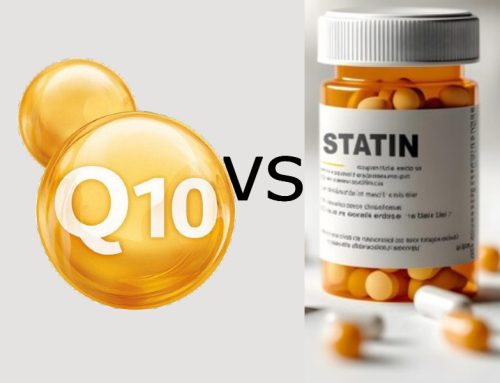
As we age, we produce less Coenzyme Q10, and we cannot make up the difference in the food we eat. For good heart health, we need a good Coenzyme Q10 supplement with documented beneficial health effects. Myoqinon and Bio-Quinone CoQ10 have been tested in gold standard clinical studies.
Last month, Dr. Joel Kahn published an interesting article on the Huffpost Healthy Living website. The title of his blog article was “Heart Failure: New Hope with Supplement Therapies.” The emphasis was on supplementation with Coenzyme Q10. Dr. Kahn focused attention on the research results from the Q-Symbio study of the effect of Coenzyme Q10 supplementation on chronic heart failure patients.
Who is Dr. Joel Kahn?
For those of you who do not know who Dr. Joel Kahn is, let me take you briefly through his résumé:
- Doctor of Medicine, Summa cum laude, University of Michigan Medical School
- Residency in internal medicine
- Fellowships in cardiology and in advanced angioplasty
- Board certified in internal medicine and cardiovascular medicine
- Director of Wellness Programs, Michigan Healthcare Professionals
- Author of medical journal articles about specialized aspects of cardiovascular medicine
- Author of two books:
- The Whole Heart Solution 2013
- Dead Executives Don’t Get Bonuses: The Ultimate Guide to Surviving Your Career with a Healthy Heart 2015
What does Dr. Joel Kahn say about Coenzyme Q10?
Dr. Kahn explains that heart failure is a disease in which the heart is not able to pump sufficient blood to supply the body’s organs with oxygen and nutrients. Approximately 5 million Americans suffer from heart failure at any given point in time. The cost to the American healthcare system is over $30 billion per year. Every year, heart failure causes over one million hospital admissions; it causes one in every nine deaths.
Conventional heart failure therapy
There are various pharmacological agents and medical devices approved for use in heart failure patients. The conventional treatments of heart failure are mostly intended to limit the extent of the body’s neurohormonal responses to heart failure, responses that put more stress on the heart. In the worse cases, a heart transplant is necessary.
Adjuvant treatment of heart failure with Coenzyme Q10
The use of the nutritional supplement Coenzyme Q10 as an adjuvant treatment of chronic heart failure has been tested and found effective. The substance Coenzyme Q10 plays an essential role in the process of cellular energy production, and it is a powerful antioxidant that disarms harmful free radicals. Coenzyme Q10 also helps to prevent the build-up of fatty deposits on the inner lining (the endothelium) of the blood vessels.
What Coenzyme Q10 research results have impressed Dr. Kahn?
Dr. Dominica Fotino’s 2013 meta-analysis of 13 studies showed that Coenzyme Q10 supplementation effectively improves ejection fraction, which is a measure of heart function.
Dr. Svend Aage Mortensen’s 2014 Q-Symbio study – a randomized, double-blind, placebo-controlled study of 420 heart failure patients – showed that adjuvant treatment with the Coenzyme Q10 preparation Myoqinon (100 mg three times daily) significantly improved symptoms, survival, and quality of life. It also resulted in significantly fewer hospitalizations of the patients.
Professor Urban Alehagen’s 2013 KiSel-10 study — a randomized, double-blind, placebo-controlled study of 443 elderly people — showed that supplementation with Coenzyme Q10 and selenium significantly reduced cardiovascular mortality during a ten-year follow-up period. In other words, Coenzyme Q10 supplement was beneficial in elderly people whose bodies were producing less Coenzyme Q10, beneficial in terms of longer lives, fewer hospitalizations, and better quality of life.
What do we know about the preparation Myoqinon used in the Q-Symbio study?
Myoqinon is the name of the prescription medicine registered in some European Union countries for the treatment of chronic heart failure. Myoqinon is produced by the Danish pharmaceutical company Pharma Nord in accordance with the requirements for medical drug production in Denmark.
Myoqinon and Bio-Quinone Q10: same material and same processes
Myoqinon is not yet available as prescription medicine in the United States; however, Pharma Nord produces its nutritional supplement called Bio-Quinone CoQ10 in the same way and using the same materials and processes as it does for the production of Myoqinon.
Special heat process to avoid re-crystallization
The production of Myoqinon (and Bio-Quinone Q10) involves the dissolving of the raw material Coenzyme Q10 in vegetable oils. The dissolved Coenzyme Q10 in vegetable oils is then subjected to a special heat treatment that keeps the individual Coenzyme Q10 molecules from re-crystallizing.
Pharma Nord has developed this special heat treatment because the temperature at which Coenzyme Q10 crystals dissolve is ten degrees Celsius higher than normal body temperature. It is important to make sure that the Coenzyme Q10 inside the Myoqinon and Bio-Quinone CoQ10 capsules does not form itself into crystals.
The human body cannot absorb the crystals, only the individual molecules, and the single molecules need to be accompanied by some fat in the diet to make the absorption possible.
Greater absorption with split doses
There will be greater absorption if the daily dosage of Myoqinon (or Bio-Quinone CoQ10) is spread out over two or three mealtimes. In other words, three 100 mg Myoqinon capsules swallowed at breakfast time will not yield the same absorption as one 100 mg Myoqinon capsule taken at breakfast, lunch, and dinner.
The benefits of Coenzyme Q10 supplementation
So much of heart disease is preventable if only we will change our style of life and change our eating habits. Taking a Coenzyme Q10 supplement is a big part of that change. You should take Coenzyme Q10 daily if you want to effect the following changes:
- Better heart muscle energy
- Less oxidative damage to the heart muscle cells
- Cleaner blood vessels
Taking charge of your heart health
The thought behind Dr. Kahn’s blog article is that there is much that we can do ourselves to improve our heart health – more plant-based foods in our diets, exercise, no smoking, alcohol in moderation – and taking a Coenzyme Q10 supplement has to be part of the plan.
What do we know about Coenzyme Q10 supplementation?
- People produce less Coenzyme Q10 as they age
- Taking statin medications inhibits a person’s production of Coenzyme Q10
- People suffering from heart failure have abnormally low blood Coenzyme Q10 concentrations
- Supplementation with Coenzyme Q10 improves symptoms and survival and quality of life for heart failure patients
- Coenzyme Q10 is safe and well tolerated
- Coenzyme Q10 supplements are affordable but do vary greatly as to quality and absorbability
Where can you find Dr. Kahn’s blog article?
To read the Huffpost Healthy Living article, please click here.








Leave A Comment